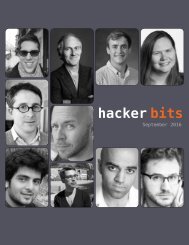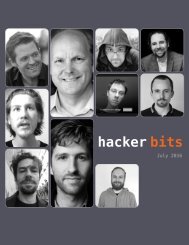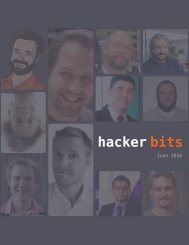Hacker Bits, April 2016
HACKER BITS is the monthly magazine that gives you the hottest technology and startup stories crowdsources by the readers of Hacker News. We select from the top voted stories for you and publish them in an easy-to-read magazine format. Get HACKER BITS delivered to your inbox every month! For more, visit http://hackerbits.com.
HACKER BITS is the monthly magazine that gives you the hottest technology and startup stories crowdsources by the readers of Hacker News. We select from the top voted stories for you and publish them in an easy-to-read magazine format.
Get HACKER BITS delivered to your inbox every month! For more, visit http://hackerbits.com.
Create successful ePaper yourself
Turn your PDF publications into a flip-book with our unique Google optimized e-Paper software.
I don't mean to be critical<br />
of anyone I've quoted. I love<br />
Joel, we founded Stack Overflow<br />
together, and his advice<br />
about interviewing and hiring<br />
remains some of the best in the<br />
industry. It's hardly unique to<br />
express these sort of opinions<br />
in the software and startup field.<br />
I could have cited two dozen<br />
different articles and treatises<br />
about hiring that say the exact<br />
same thing: aim high and set<br />
out to hire the best, or don't<br />
bother.<br />
This risk of hiring not-thebest<br />
is so severe, so existential a<br />
crisis to the very survival of your<br />
company or startup that the<br />
hiring process has to become<br />
highly selective, even arduous.<br />
It is better to reject a good applicant<br />
every single time than<br />
accidentally accept one single<br />
mediocre applicant. If the interview<br />
process produces literally<br />
anything other than unequivocal<br />
"Oh my God, this person is<br />
unbelievably talented, we have<br />
to hire them", from every single<br />
person they interviewed with,<br />
right down the line, then it's an<br />
automatic NO HIRE. Every time.<br />
This level of strictness always<br />
made me uncomfortable.<br />
I'm not going to lie, it starts with<br />
my own selfishness. I'm pretty<br />
sure I wouldn't get hired at big,<br />
famous companies with legendarily<br />
difficult technical interview<br />
processes because, you know,<br />
they only hire the best. I don't<br />
think I am one of the best. More<br />
like cranky, tenacious, and outspoken,<br />
to the point that I wake<br />
up most days not even wanting<br />
to work with myself.<br />
If your hiring attitude is that<br />
it's better to be possibly wrong<br />
a hundred times so you can be<br />
absolutely right one time, you're<br />
going to be primed to throw<br />
away a lot of candidates on pretty<br />
thin evidence.<br />
Perhaps worst of all, if the<br />
interview process is predicated<br />
on zero doubt and total confidence<br />
… maybe this candidate<br />
doesn't feel right because they<br />
don't look like you, dress like<br />
you, think like you, speak like<br />
you, or come from a similar<br />
background as you? Are you<br />
accidentally maximizing for<br />
hidden bias?<br />
One of the best programmers<br />
I ever worked with was<br />
Susan Warren, an ex-Microsoft<br />
engineer who taught me about<br />
the People Like Us problem, way<br />
back in 2004:<br />
I think there is a real<br />
issue around diversity<br />
in technology (and most<br />
other places in life). I tend<br />
to think of it as the PLU<br />
problem. Folks (including<br />
MVPs) tend to connect best<br />
with folks most like them<br />
("People Like Us"). In this<br />
case, male MVPs pick other<br />
men to become MVPs. It's<br />
just human nature.<br />
As one reply notes, diversity<br />
is good. I'd go as far as<br />
to say it's awesome, amazing<br />
and priceless. But it's<br />
hard to get to the classic<br />
chicken and egg problem<br />
if you rely on your natural<br />
tendencies alone. In that<br />
case, if you want more<br />
female MVPs to be invited,<br />
you need more female<br />
MVPs. If you want more<br />
Asian-American MVPs to<br />
be invited, you need more<br />
Asian-American MVPs, etc.<br />
And the (cheap) way to<br />
break a new group in is via<br />
quotas.<br />
IMO, building diversity via<br />
quotas is bad because they<br />
are unfair. Educating folks<br />
on why diversity is awesome<br />
and how to build it<br />
is the right way to go, but<br />
also far more costly.<br />
hacker bits<br />
9















